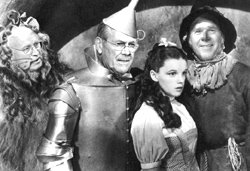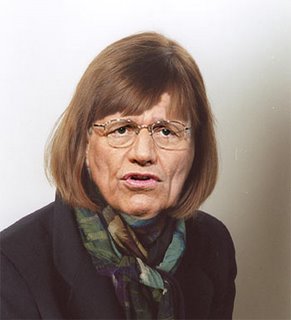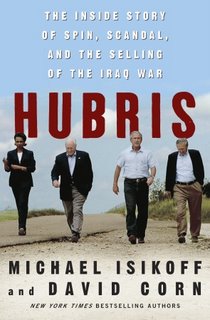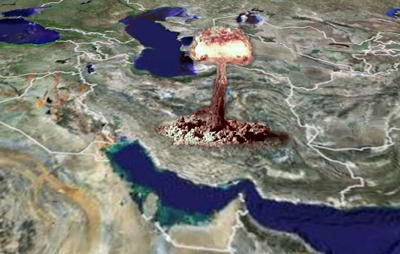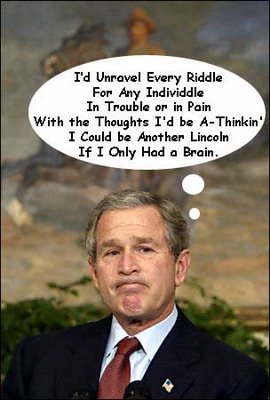
It was no surprise that The Washington Post endorsed Reaganite-turned-Democrat James Webb for Senate in Virginia over Republican incumbent George Allen. Macaca. The n-word. Jewish "aspersions." Allen has made a mess of his reelection bid and displayed his inner-boob. But this line caught my eye:
[Webb] -- former Navy secretary, former assistant defense secretary, former Marine Corps officer and former Republican -- is admirably independent-minded. He was prescient in warning, back in 2002, that the war in Iraq risked stranding the United States in a long-term occupation without an exit strategy.
What's odd with this picture? The paper's editorial board was a leading advocate of the war before the invasion and has continued to insist the invasion was the right call. Now, the paper's editorialists hail a candidate for having issued warnings the paper itself ignored. If only the Post had been as prescient.
RUMOR ALERT. Former Clerk of the House Jeff Trandahl has told the House ethics committee about two Republican House members who had sex with congressional pages, and neither man is page-chaser Mark Foley. That's the rumor circulating in Washington. One of these Republicans supposedly had sex with a male page; one with a female page. The names of the implicated Republicans are on the rumor-mill, but I'm not going to disclose these identities. I assume if there's truth to this, the allegation will become public. (But then I assumed someone would post The List.) In any event, what impact would such a revelation have on the coming elections? Are Republicans bracing for this bombshell? Perhaps they're preparing to blame Democratic operatives.
CORN VS. GREENBERG RE WOODWARD. Day 3. I know many of you have been waiting to see how I answered Greenberg's pressing question: What would you prefer to give up--Woodward or a whole gang of pundits and commentators (Dowd, Matthews, Moyers and others). Well, the wait is over. My reply is posted on The New Republic site today. Tomorrow, Greenberg gets the final word in our exchange. Here is my last shot:
Bob Woodward's State of Denialby David Greenberg & David Corn
Dear David G.,
Civil and enlightening, of course. Let me start with your entertaining but false choice: Dowd, Will, Matthews, Moyers, Brooks, Russert, Limbaugh, and Air America--or Woodward. Hmmmm. But that's apples and aardvarks. I'm hardly suggesting that Woodward should hang up his notebook and become a pundit (though he does do his share of punditing at times). Nor do I wish to see commentary supplant reporting. After all, the new book I co-wrote with Michael Isikoff, Hubris: The Inside Story, of Spin, Scandal, and the Selling of the Iraq War, is in-depth narrative reporting about the intrigue and fights that occurred at the CIA, White House, State Department, Pentagon, and Congress concerning the Bush administration's sales campaign for the war. And, as I noted before, it covers plenty of important ground Woodward did not examine in his books. But I might prefer to see Chris Matthews challenging an administration's argument for war in real-time than Bob Woodward collecting string behind the scenes (even rather interesting string) and missing the story--in this case, that the White House misrepresented the intelligence to win public support for a war.
The issue is not these op-ed and cable news commentators versus Woodward; it's Woodward versus Woodward. A reporter who uses his unparalleled access to chronicle the inner workings of the palace versus a reporter who exposes government malfeasance or nonfeasance. Before you protest, I'm not saying that this is an absolute, black-and-white dichotomy and that Woodward only takes self-serving dictation from top-dog players and reveals no wrongdoing. But Woodward certainly used to do more of the latter than the former. And, in the George W. Bush years--prior to State of Denial--Woodward got the balance wrong. (THE NEW REPUBLIC'S Jason Zengerle explains this well in his recent GQ article on Woodward.)
You write, "[T]he beef is that Woodward's reportorial skills aren't matched by an equal analytical prowess--or even by an inclination to interpret his material. As a result, it's alleged, he's too credulous toward his sources' accounts or too immersed in the weeds to see the big picture." Yes, his critics have accused him of such. But my beef is not that he doesn't analyze data; it's that, when it counted most, he skated past the big picture by not reporting on it--for whatever the reason. In an interview with Zengerle, Woodward said, "I think the most important story of the Bush administration is the decision to go to war in Iraq. That's what he's going to be remembered for, and, I think, trying to find out how that happened--and why--is worthy." Woodward was not wrong to focus on the Bush administration's decision-making process (such that it was), but his fixation on the internal deliberations of the Bush clan apparently caused him to overlook what was happening elsewhere in the U.S. government (such as the disputes over intelligence in the various intelligence agencies) and to lose sight of an equally (if not more) significant plot line: Bush was not being honest with the public about his case for war.
As Hubris illustrates, the selling of the war was the original sin of the Iraq war. The sales campaign created false public fears and expectations and led administration officials to neglect (in a reckless fashion) planning for the post-invasion period, which quickly became a debacle. Woodward was part of that first failure. In my opening salvo of this exchange, I cited his pre-invasion comments on CNN. While he did (as you note) first refer to what administration officials were thinking, he clearly went on to endorse the administration's case for war by proclaiming, "The intelligence shows...there are massive amounts of weapons of mass destruction hidden, buried, unaccounted for." He was not merely reporting that this was Bush's claim; he was putting the Bob Woodward stamp of approval on the administration's key assertion that the intelligence was solid. With other reporters (though not many) at that time digging deeper and uncovering evidence the White House was misrepresenting the case against Iraq, why wasn't Woodward doing the same? Why did Plan of Attack sidestep this crucial matter? Why does State of Denial, which revisits the pre-invasion period, not cover this?
Here is another tough question, David: Why is it only now that Woodward is reporting that Bush denies reality? This has been evident for years. Yet it was not part of Plan of Attack, which came out in the middle of the 2004 election campaign. I'm not expecting Woodward to be omniscient (even if his books have such a tone) and to know everything before every other reporter (even if he has better high-level access than any other journalist in town). But, before and after the invasion, there were reporters breaking stories on the administration's faulty, flimsy and fraudulent case for war. Warren Strobel, Jonathan Landay, and John Walcott at Knight Ridder come to mind. And Woodward only had to read his own paper to see something was amiss. On March 18, 2003, in a story headlined "BUSH CLINGS TO DUBIOUS ALLEGATIONS ABOUT IRAQ," Post reporters Walter Pincus and Dana Milbank wrote,
As the Bush administration prepares to attack Iraq this week, it is doing so on the basis of a number of allegations against Iraqi President Saddam Hussein that have been challenged -- and in some cases disproved -- by the United Nations, European governments and even U.S. intelligence reports.
Woodward didn't employ his talents and superb connections to chase this story--either for his newspaper (which buried the Pincus/Milbank article on page A13) or for Plan of Attack. As you say, that book did break some important news--the early planning of the Iraq invasion, the shifting of hundreds of millions of dollars--but not the most important tale: What went wrong as Bush decided to go to war.
I certainly don't want to ship Woodward off to a home for retired shoe-leather journalists. But it seems clear that he mis-deployed himself during Bush's first term and that State of Denial is an attempt to right his course. Plugging his new book on "60 Minutes," Woodward summed up the volume this way: "It is the oldest story in the coverage of government: the failure to tell the truth." Can you--or he--argue that Bush began to fail to tell the truth only after Woodward published Plan of Attack? If not, why did Woodward's pre-Denial reporting not tackle that subject dead-on?
I admire your loyalty to your former colleague. I am trying to present a balanced criticism of his recent work, acknowledging his successes while pointing out his failings. Judging from your first reply, I assume you believe that not since the days of Nixon has there been an administration so deserving of fierce and vigorous investigative reporting that challenges its assertions and vets its actions. Woodward was well-positioned to take on those tasks. But he opted for a different form of interaction with this administration. Exploiting the relationship he forged with the Bush crowd, Woodward has produced some good journalism, but not the journalism that was most needed.
Thanks for engaging,
David C.
Posted by David Corn at October 19, 2006 03:29 PM
